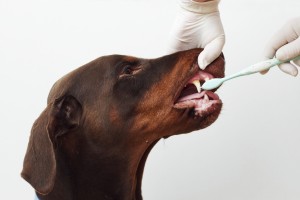 The line between fact and fiction used to be rather formidable, but these days, it’s downright fuzzy. Thanks in part to reality television and sensational media, we all seem to wonder what is actually real. Indeed, what is the truth?
The line between fact and fiction used to be rather formidable, but these days, it’s downright fuzzy. Thanks in part to reality television and sensational media, we all seem to wonder what is actually real. Indeed, what is the truth?
In spite of this unclear outlook, Billings Animal Family Hospital knows some things are absolute, and one of them is the importance of your pet’s dental health. Our unwavering commitment to this will hopefully inspire you to pick up your pet’s toothbrush and get cleaning!
Because it’s Proper
Our previous blog posts have outlined proper pet dental care, the benefits associated with cleanings under anesthesia, digital x-rays, and whether or not dental chews are effective. In honor of February being National Pet Dental Health month, we want to share more information regarding your pet’s dental health and its connection to overall wellness and longevity.
The Pinnacle of Care
Plaque and tartar build up on your pet’s teeth every day. Without regular cleanings, your pet is primed to develop periodontal disease.
Bacteria in the plaque causes inflammation and deep pockets in the gums surrounding a tooth. Not only does periodontal disease result in tooth loss, it can also be linked to systemic illness and infection of the heart, liver, or kidneys. Plus, attempting to fight bacteria every day puts a lot of unnecessary strain on your pet’s body.
Food for Thought
Your pet’s dental health truly matters to us, and we hope you take the following points to heart:
- Symptoms of periodontal disease include bad breath, drooling, and refusing to eat. By the time you notice these red flags, the damage to your pet’s teeth and gums is already done. In fact, 80% of all cats and dogs over age three have periodontal disease at one stage or another.
- When we view your pet’s mouth during his or her wellness exam, we can really only see a fraction of what’s going on in there. We look for abscesses, oral injury, correct bite, gingivitis, fractured teeth, enamel damage, and buildup of tartar and calculus.
- Anesthesia is necessary to conduct a full oral exam. Not only will your pet remain still throughout the procedure, he or she will not have to experience any fear, anxiety, or related pain.
- Because ⅔ of each tooth lies below the gum line, digital radiographs are critical to gaining a complete picture of your pet’s oral health.
- We perform pre-anesthetic blood testing to ensure your pet can safely handle anesthesia. Throughout the procedure, your pet’s heart rate, blood pressure, and temperature are carefully monitored.
We understand that dental procedures can be stressful for owners, so please reach out to us with any other questions or concerns.
What the Radiographs Show
We may recommend treatment for the following common dental conditions:
- Fractured Teeth – Your pet may have a broken or fractured tooth from an injury or chewing on a hard object. This can be a problem because naturally occurring bacteria in the mouth can infect the entire broken tooth and surrounding bone. We’ll do everything we can to save the tooth (a root canal or pulpotomy may work in lieu of extraction).
- Dead Teeth – Teeth die for various reasons, and your pet may never show signs of pain. Often, an exposed root or a periodontal lesion can explain a dead tooth. It’s also important to remember that not all discolored teeth are dead.
- Worn Teeth – Your pet may like to chew on abrasive items, but they can play a role in wearing teeth down. While this can be significant over time, a worn tooth can remain healthy and alive.
Reduce the Risk
The truth of the matter is that your pet’s dental health is positively linked to having a longer, happier life. The team at Billings Animal Family Hospital is here to support every aspect of your pet’s health, and we hope you’ll contact us with any questions. Happy brushing!






